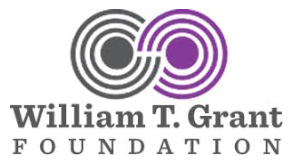
Tuesday, September 25th 2018 was National Voter Registration Day, and GW faculty members came together for a conversation on our role in promoting the importance of voting to our students. This event was part of the Nashman Center’s monthly series: Conversations on Community-Engaged Scholarship.
Guest speaker Zaneeta Daver, from the ALL IN Campus Democracy Challenge opened with data on college-student voting rates as well as her own anecdotal experiences regarding campus initiatives that increase student voting.
Amy Cohen, Executive Director of the Nashman Center, then provided research findings on GWU’s voter turnout. This information was collected by the The National Study of Learning, Voting, and Engagement (NSLVE). It is worth clicking through the NSLVE’s report on GW student voting, which compares voter turnout in 2012 and 2016, noting increases and decreases by a number of demographics, including by major of study. The report also compares the GW student vote to their national study pool. The big picture is that 57.9% of GW students voted in 2016, compared to 50.4% of students nation-wide.
Although the national average of college students who vote is relatively small, GW remains slightly above average: 57.9% of GW students voted in the 2016 election, compared to 50.4% of college students in the NSLVE study.
From there, the faculty gathered discussed measures to be taken to increase the population of students who vote. Zaneeta Daver framed the issue as having two components: teach the process and motivate.
Process issues including understanding how and when to register, how to obtain and submit an absentee ballot. For younger students, even obtaining an envelope and stamp has proven to be a barrier, as voting may be their only occasion to submit postal mail.
Several institution level efforts were suggested, including making sure that incoming first-year students are reminded to take steps to register and request an absentee ballot before they move to campus. Daver explained that some states require that absentee ballots be requested in person the first time a person votes - creating a barrier to students who didn’t think to do this before coming to campus in August.
The group also discussed faculty level efforts to address student voting, particularly, to what extent do we bring up voting in the classroom? Some described their existing approaches to weave the importance of voting into their course content. Some felt that this is easier to do for certain course topics/disciplines, however all felt it was important to bring up regardless.
One simple way suggested by Amy Cohen is to spend just five minutes in the beginning or end of class to introduce students to TurboVote. TurboVote is a GW-customized online service that makes registering to vote easier for students. Once they sign up, they receive timely notifications based on their local/state elections (i.e. registration deadline, absentee ballot deadline, and where to get information about candidates).
GW resources to share with students:
Resources on voter education (information on candidates and ballot initiatives/issues):















